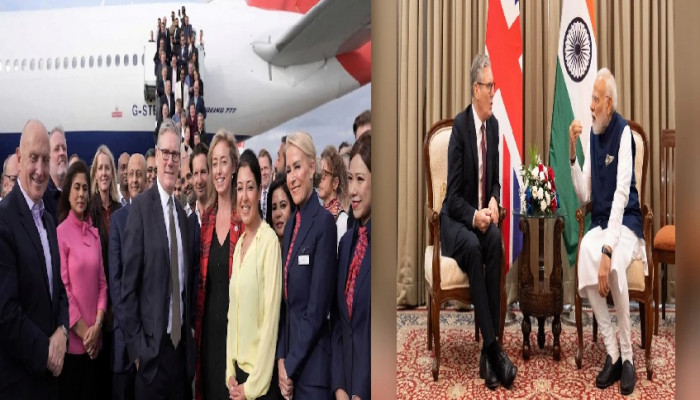India at the Helm: A New Chapter in UK-India Relations
- In Foreign Policy
- 04:38 PM, Oct 11, 2025
- Ramaharitha Pusarla
Describing his first-ever visit to India as a ‘two-parter’, UK Prime Minister Keir Starmer, who was accompanied by the largest ever delegation of 126 members, landed in Mumbai for a two-day visit on October 8. Accorded a grand welcome at Mumbai airport by Maharashtra governor Acharya Devvrat, Chief Minister Devendra Fadnavis and two deputy CMs, Starmer’s choice of the destination, the financial and economic capital of India, has set the context of the visit. Starmer’s follow-up visit, barely two and a half months after PM Modi’s quick trip to the UK to sign the Comprehensive Economic and Trade Agreement (CETA), was all about facilitating investments and revitalising trade.
Hitting the ground with the clear aim of revitalising economic ties, after a brief series of meetings with business leaders in India, Starmer visited Yash Raj Films, where agreements were signed to produce three Indian films in the UK. He then attended a football-related event organised by the UK Premier League. Though Starmer’s trip was framed in July, currently, his political survival is hanging by a thread. Heading a Labour party government that has pulled off a landslide victory in recent times, Starmer is increasingly finding himself in a political quicksand of plummeting popularity, desertions, domestic weariness over immigration and a stubbornly stagnant economy.
Starmer has successfully managed to win back the Jewish community after his predecessor Jeremy Corbyn’s outlandish anti-semitic remarks. However, a terrorist attack on a synagogue in Manchester on the holiest Yom Kippur Day (October 2), leading to the death of two men, has sparked fears of rising hate crimes against Jews.
Earlier in September, Starmer appointed Pakistan-origin Shabana Mahmood as Home Secretary following the resignation of Deputy Prime Minister Angela Rayner over tax evasion in a house purchase. Her appointment has raised concerns among the British Indian Diaspora, given Mahmood's strong anti-India bias, a history of participation in protests outside the Indian High Commission and controversial statements on the abrogation of Article 370. In fact, alongside the Cabinet reshuffle, Starmer had to dismiss the UK ambassador to Washington, Peter Mandelson, due to his links with Jeffrey Epstein. Starmer faces a multi-faceted loss of confidence from various communities, along with domestic issues such as the soaring housing crisis and protests against government plans for digital ID cards.
Politically, he is encountering challenges to his leadership from rival Andy Burnham, the Mayor of Manchester, and Reform UK leader Nigel Farage. Additionally, the defection of a Labour Councillor to Reform UK in mid-September has left Starmer on a precarious political footing. His delicate balancing act on immigration—trying to avoid alienating the far-left with a tough stance while enabling the mobility of skilled workers—has not been successful. Indeed, Starmer’s failure to manage the immigration crisis has resulted in far-right protests led by Tommy Robinson.
The UK is sitting on the tinderbox of the immigration issue. Voters are growing increasingly weary of the ghettoisation of communities, and every politician worth his salt is now carefully weighing their stance on the same.
Mobility plays a vital role in trade negotiations. However, Starmer’s clear statement that visas for Indians “isn’t part of the plan” shows his subtle separation of trade from migration issues. Wary of the immigration controversy and its effect on electoral strategy, Starmer purposely avoided discussing visas before the bilateral talks. In fact, countries have agreed on talent movement in 35 sectors within CETA for two years. Furthermore, the trade deal features a layered tax exemption for Indians working temporarily in the UK for three years under the Double Contribution Convention (DCC).
Starmer’s fragile political position and growing public dissatisfaction are clearly shown by his falling popularity, as indicated by The Sunday Times MRP survey, which ranks Starmer as the most unpopular Prime Minister in 70 years. Elected on the campaign slogan of change, he has failed to deliver on immigration, economics, and employment, and has been embroiled in allegations of scandals. In a YouGov poll from mid-September, only 21% held a ‘favourable' view of Starmer, while 71% expressed a negative opinion, resulting in a net score of -50%.
The only bright spot amid the disarray was the UK’s trade deal with the US. However, it failed to substantially rejuvenate the manufacturing sector, with the economy falling to zero growth after a 0.4 per cent rise in June.
Ostensibly, the effective implementation of CETA, with a targeted doubling of bilateral trade to $112 billion, is expected to significantly boost employment and increase the GDPs of both countries. This notable economic revival through sectoral expansion, which aligns with the “Global Britain” foreign policy framework, could greatly enhance the sinking credibility of the Starmer government. An economic upswing combined with investment announcements may provide a much-needed boost for Labour, which has failed to deliver tangible economic benefits. Corbyn’s interventionist and confrontational stance towards India, along with alienating the Indian diaspora, damaged goodwill with India. Starmer’s current visit with a large entourage to date, appears to be a conscious attempt to gain some favourability.
The CETA trade deal is a ‘launch pad’ for the UK, aiming to weather the post-Brexit turmoil—through a credible economic recovery to restore its international prominence. Tipped to become the third-largest economy by 2028, India is economically a dominant force to reckon with. Besides, unwaveringly steering India amid Trump’s torrential tariff storm with aplomb, PM Modi has positioned India as an emerging global power. As countries scramble with erratic tariff levies, numerous agencies have projected a favourable economic landscape for India. As the fastest-growing large economy, India is seen as a green shoot for investments. The UK believes that India is the best bet against Trump’s uncertain trade policies.
Rebutting Trump’s derisive ‘dead economy’ jibe at India, Starmer stated, “Everything that I have seen since I have been here is absolute proof to me that you are on track to succeed”. This pushback against the US president’s rhetoric is a vindication of India’s growth story, which is attracting the attention of the EU and Germany as well. With its steady economic footing and compelling growth prospects, India has emerged as a formidable force on the global stage.
Apart from discussions on global and regional issues of mutual interest, leaders focused on Growth, Technology and Innovation, Defence and Security, Climate and Energy, and Education. Embracing the mantra of synergistic cooperation for mutual benefit through trade and technology, leaders addressed the Global Fintech Fest and the reconstituted India-UK trade forum.
Bolstering the Trade Security Initiative (TSI) launched in 2024, countries expanded its ambit with the inclusion of three new initiatives- India–UK Connectivity and Innovation Centre; India–UK Joint Centre for AI and UK India Critical Minerals Processing and Downstream Collaboration Guild. To unlock investment opportunities and integrate advanced technology, a new satellite campus will be established at IIT-ISM Dhanbad.
Coinciding with Starmer’s UK and Indian navies held a joint exercise KONKAN, and agreed to jointly set up the Regional Maritime Security Centre for Excellence (RMSCE) under the India-Pacific Ocean Initiative (IPOI). In a significant move, India offered to send qualified Indian Air Force Flying Instructors to train the UK’s RAF as part of military training cooperation. Under the complex weapons cooperation, the India and UK governments signed $468 million contract for the supply of Lightweight Multirole Missile Systems (LMM) and $335 million implementing agreement for collaboration on electric-propulsion systems for Indian Navy ships. LMMs, also known as Martlets, are manufactured by Thales Air Defence.
Reciprocating Starmer’s warm reception at Chequers with a lavish welcome in Mumbai, PM Modi conferred a foreign policy achievement on the Labour government to showcase. The trade deal—arguably the most economically significant agreement signed by the UK since Brexit is a shot in the arm for Starmer, who has been grappling with waning public approval.
Collaborating on zero-emission targets, countries announced the Climate Tech Start-Up Fund, established the Offshore Wind Taskforce and explored opportunities to work through the Global Clean Power Alliance (GCPA). In a landmark development, nine UK institutions are setting up campuses in India. The University of Southampton at Gurugram, with the approval from UGC, is commencing admissions. Through strategic partnerships in advanced biotechnology, centres of excellence in India and the UK are collaborating in Biomanufacturing, 3D Bioprinting and Genomics. The UK government signed an MoU with SBI to support innovative entrepreneurship in climate technology and AI. Countries launched the third phase of the Biomedical Research Career Program while the Indian Council of Medical Research (ICMR) and the UK’s National Institute of Health and Care Research (NIHR) signed a Letter of Intent (LoI) to deepen health research.
Starmer’s outreach to the Indian business community accrued $1.3 billion projects from 64 investments, translating into 7000 jobs spanning electric bikes, agriculture technology, semiconductors, AI and education sectors in the UK. The British Chip Designer Graphcore revealed plans to invest $1.3 billion towards building research infrastructure in India.
“Turbocharging” bilateral trade amid an unpredictable and uncertain geopolitical environment, PM Modi and PM Starmer infused a new momentum into an old relationship. Expressing their commitment to robust security of the Indo-Pacific region, countries also discussed the abuse of freedoms by extremist and radical elements. Apparently, PM Modi has raised the issue of anti-Indian Khalistani elements and the extradition of economic fugitives sheltered in the UK.
As burgeoning protectionist policies upend the global economic order, India stands out by leveraging the power of three Ds- Democracy, Demographic Dividend and Demand. This unique interplay has bestowed India with a strategic advantage. In contrast to the post-Brexit UK’s sputtering economy, India’s consistent upward trajectory signals a coming of age. With PM Modi at the helm, New Delhi is redefining the India-UK ‘win-win’ partnership.
References
- https://www.firstpost.com/world/why-starmer-wants-to-talk-trade-services-but-not-immigration-13940425.html
- https://www.hindustantimes.com/india-news/wont-relax-visa-rules-for-indians-uk-pm-keir-starmer-ahead-of-his-mumbai-visit-101759900156033.html
- 'Everything I've Seen Absolute Proof...': UK PM Starmer Rebuts Trump's 'Dead' Economy Claim On India
- https://www.gbnews.com/politics/keir-starmers-favourability-plunges-prime-minister-rank
- https://www.mea.gov.in/bilateral-documents.htm?dtl/40185/IndiaUK_Joint_Statement_October_09_2025
- https://www.mea.gov.in/bilateral-documents.htm?dtl/40184/List_of_outcomes_Visit_of_the_Prime_Minister_of_the_United_Kingdom_to_India_October_08__09_2025
- https://economictimes.indiatimes.com/news/economy/foreign-trade/uk-celebrates-6900-new-jobs-from-indian-cross-sector-investments/articleshow/124423427.cms?from=mdr







Comments